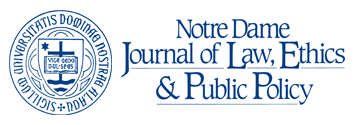Notre Dame Journal of Law, Ethics & Public Policy Online
Document Type
Article
Publication Date
2016
Abstract
The First Amendment, adopted to safeguard human liberty and autonomy, was construed by the U.S. Supreme Court in its 2008 Citizens United decision in a way that undermines those important foundational values. This turn in First Amendment jurisprudence represents a radical departure from the Anglo-American free expression tradition in law, as well as in political philosophy, represented prominently by John Stuart Mill, the author of On Liberty. Although the decision is nominally premised on the interests of citizens to avoid discrimination based on speaker identity, to hear others’ uncensored expressions of ideas, to access political information that will enable them to participate effectively in democratic government, and to be protected when they engage in political dissent, the blow that the decision deals to campaign finance reform produces effects that instead undermine human liberty and self-government.
Recommended Citation
Bell, Melina Constantine, "CITIZENS UNITED, LIBERTY, AND JOHN STUART MILL" (2016). Notre Dame Journal of Law, Ethics & Public Policy Online. 6.
https://scholarship.law.nd.edu/ndjlepp_online/6

